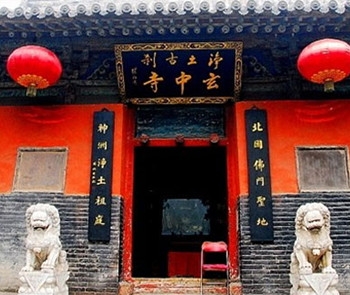
五台名刹画沧桑
The Famous Monastery Witnesses Vicissitudes
常书鸿 李承仙
Chang Shuhong& Li Chengxian
1985年7月24日至10月30日,我和李成仙为完成日本东京枣寺前住持管原惠庆长老之遗愿,应邀为该寺绘制《玄中寺组画》。
At the invitation of the Buddhist abbot of the Date Monastery in Tokyo, Japan, Li Chengxian and I did a set of mural paintings of the Xuanzhong Monastery—Monastery of Mystery for the Date Monastery from July 24 to October 30, 1985, thus carrying out the behest of Keikyo Sugehara, the late abbot of the well-known Japanese Buddhist temple.
玄中寺位于距山西省太原市60公里的吕梁山脉的石壁山中。据记载,寺为北魏延兴二年(公园472年)由高僧云鸾大师所建。云鸾研究佛学,专修净土,先后撰写了《净土十二偈》、《续龙树偈》、《调气论》、《往生论注》等著作,得到北魏孝文帝的尊重,赐号“神云”,故常推为净土教的始祖。
The Mystery Monastery is located in the Lvliang Mountains, 60km from Taiyuan in Shanxi Province, China. Records show that the temple was built by an eminent monk named Tanluan in the 2nd year of Yanxing (472) of the Northern Wei Dynasty (386—534). Master Tanluan was a Buddhist scholar, specializing in the Sukhavati Sect. He wrote The Twelve Gathas of the Sukhavati and some other important works. He won the respect of Emperor Xiaowen, who granted him the title of “Tan, the Immortal”. That is why Master Tanluan is commonly regarded as the founder of the Sukhavati Sect.
至隋唐时代,高僧道绰,善导都先后在玄中寺住持、探讨、研究净土佛学,讲经说法。玄中寺成为我国佛教净土宗的祖庙和中国北方的主要道场,在中国佛教史上有十分重要的地位。因此,唐代之后,随迭遭兵乱,但屡毁屡建,以至保存到现在。
In the Sui (581一618) and Tang (618—907) Dynasties, eminent monks like Daochuo and Shandao became abbots of the temple successively, where they distinguished themselves in the study of the doctrine of the Sukhavati Sect. The Mystery Monastery is the first temple of the Sukhavati Sect and a principal Buddhist temple in Northern China. Obviously, the Monastery occupies an important position in the history of Buddhism in China. Although it was destroyed many times during dynastic wars, it was rebuilt time and again so that it is now preserved as before.
从唐代以来,以云鸾、道绰、善导所创立的净土法门体系传到日本后,日本高僧法然和亲鸾,先后以三位大师著作为依据,立教开宗,建立了日本佛教净土宗和净土真宗。自此,与玄中寺一脉相承的净土宗教义在日本广为流传。
Since the Tang Dynasty, the doctrine of the Sukhavati Sect originated by Tanluan, Daochuo and Shandao has been passed on to Japan, where Japanese eminent monks like Horan and Qinluan founded the Sukhavati Sect in Japan on the basis of the Buddhist works by the above-mentioned three Chinese masters. That is how the doctrine of the Sukhavati Sect, which originated in the Mystery Monastery in China, has been wide spread in Japan.
1920年12月27日,日本常盘大定博士历尽千辛万苦寻访了山西玄中寺,并著书立说,玄中寺即被尊为日本佛教净土宗的祖庭。1942年秋,日本佛教界著名人士常盘大定博士、管原惠庆长老等专程前来玄中寺举行了纪念云鸾大师圆寂一千四百年奉赞会。当时管原惠庆长老怀着对祖庭的崇高敬意,从寺中摘了一把枣子带回日本,经过精心培育,长成了一棵枣树。长老遂把自己住持的寺院更名为枣寺。
On December 27, 1920, Dr. Daitei Tokiwa, having gone through all kinds of hardships and difficulties, reached the Mystery Monastery in Shanxi Province. He wrote many books to confirm the fact that the Japanese Sukhavati Sect of Buddhism originated in the Mystery Monastery of China. In the fall of 1942, Dr. Daitei Tokiwa and Master Keikyo Sugehara made a special trip to the Mystery Monastery and held a ceremony there in commemoration of the 1,400th anniversary of the death of Master Tanluan. Having a deep respect for the founder, Master Sugehara picked a handful of dates from the date tree in the Monastery and took them to Japan. He planted the seed in his monastery, where, with the meticulous care, it has grown into a big date tree. So Master Sugehara named his temple “The Date Monastery”.
日本佛教界朋友们在战后非常困难的情况下,为促进中日友谊作了大量工作。1953年大谷萤润、管原惠庆等收集了战争中在日本殉难的七千余中国烈士之遗骨送还中国。周恩来总理生前曾以“饮水不忘掘井人”来赞扬日本朋友们,肯定了他们对中日关系正常化所起的作用。
After World War II, friends in the Japanese Buddhist world did a lot to promote the friendship between Japan and China under most difficult conditions In 1953, Eyun Otani, Keikyo Sugehara and others gathered remains of over 7,000 Chinese prisoners of war who died in Japan during the war, and sent them back to China. In high praise of the Japanese friends for their contributions to the normalization of relationship between the two countries, the late Premier Zhou Enlai said: “Don't forget the well-diggers when you drink from the well.”
1977年日本佛教界朋友成立了“日中友好净土宗协会”。管原惠庆长老不遗余力,在他84岁高龄时,还创办了《玄中一派》的期刊,致力于日本中国友好的宣传。
In 1977, friends in the Japanese Buddhist world set up the Japan-China Friendship Association of the Sukhavati Sect. Master Keikyo Sugehara in spite of his advanced age of 84, started the publication of the magazine True Disciples of the Mystery Monastery, thus making fresh efforts to promote the friendship between the Japanese and Chinese peoples.
早在1958年我们第一次在日本举办敦煌艺术展览时,管原惠庆长老曾邀请我们为他的寺院绘制五台山壁画。但因为当时敦煌百废待举工作繁重,无法承担。管原惠庆长老于1982年2月仙逝。枣寺继承人为完成管原惠庆长老热心中日友好和文化交流的遗愿,正式邀请我和李承仙东渡日本在新落成的枣寺正殿绘制壁画。我们受文化部和中国佛教协会的委派,与1985年绘制了《玄中寺组画》。
As early as 1958,the year when the Dunhnang Murals Exhibition was held first time in Japan, Master Keikyo Sugehara invited Li Chengxian and me to do paintings of Wutai Mountain for his monastery. As that was the time when we were busy restoring the Dunhuang Murals, we could find no time for that task. In February, 1982, Master Sugehara passed away. To carry out his last wish and promote the friendship and cultural exchange between Japan and China, the present abbot of the Date Monastery sent us an official invitation to paint murals in the newly constructed Main Hall of his monastery. In 1985, the Chinese Ministry of Culture and the China Buddhist Association entrusted us with the responsibity for the work.
《玄中寺组画》的创作构思和绘制技法,是我们本着对敦煌艺术临摹和研究40多年的经验,主要继承中华民族遗产的风格,吸取了敦煌唐宋时代壁画法华经《化城喻品》等艺术风格形成的。我们在画幅中按照其地理环境和内容,标出15个榜题,即:山西五台山、挂山古松、太原双塔、文水之渡、玄津石桥、秋容胜境、永宁禅寺、大玄中之寺、象离大和尚之塔、管原惠庆长老之塔、中日友谊之树、大祖师之殿、俱会一处之冢、西方圣境、大千佛之阁。在画幅上部七身奏乐飞天配以随风飘动的七种乐器,以表现天上、人间、中日深厚的友情。
As Li Chengxian and I had engaged in the study and copying of the Dunhuang Murals for 40-odd years, we did the set of mural paintings of the Mystery Monastery after the techniques and style of the Dunhuang art. The murals are composed of 15 paintings, each presenting a different location or content: Wutai Mountain in Shanxi, Old Pines on Gua Hill, Twin Pagodas in Taiyuan, China-Japan Friendship trees, the Pure Land, to name just a few.
这是我们在日本东京一百个日日夜夜劳苦工作的结晶,用心血谱写出来的中日友情。愿中日两国人民像飞翔在天上的香音神那样,世世代代友好,愿中日友好文化交流万古长青!
We worked hard day and night for over three months. The paintings symbolize our efforts to contribute to the friendship between the Chinese and Japanese peoples. May the cultural exchange be everlasting between China and Japan.
更多翻译学习资源,敬请关注可可英语。












